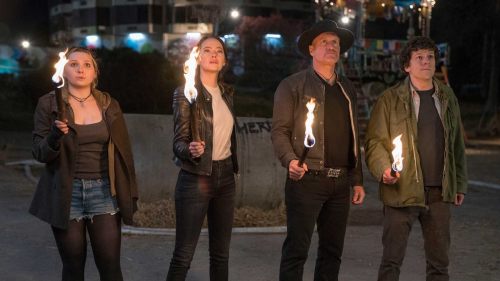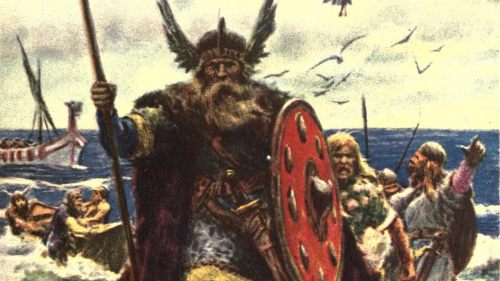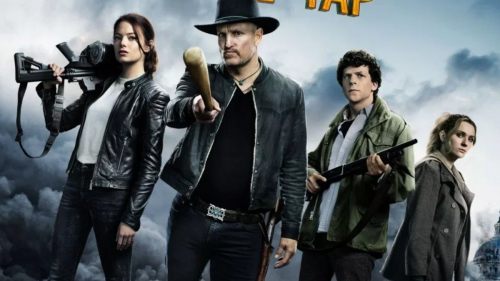THE HUMMINGBIRD PROJECT Review: Guzzling The Nectar Of Capitalism
The internet is fast. But it’s not fast enough for the one percent, and when the one percent want something, they’ll move heaven and (in this case) earth to get it. Kim Nguyen’s The Hummingbird Project, tells an Internet infrastructure story set in the stock-market world, but its subject material quickly turns to greed, revenge, and toxic ambition.
The Hummingbird Project is a pretty straightforward men-on-a-mission movie, with a painfully capitalist twist. The men are stock trader Vinnie (Jesse Eisenberg), his cousin and fibre expert Anton (Alexander Skarsgård), and their project manager Mark (Better Call Saul’s Michael Mando). Their mission: to lay a thousand-mile-long, four-inch-wide fibre cable in a straight line from Kansas City to New York, in order to gain milliseconds of speed advantage in financial transactions (and make a shit-ton of money leasing the line). All that stands in their way are landowners, logistical issues, the Appalachian Mountains, and their former employer Eva Torres (Salma Hayek), bent on revenge for their betrayal of her financial services firm.
A film about laying cable is a pretty dry proposition, no matter how lengthy or difficult the job is, given that our usual encounters with the subject tend to involve waiting for someone to hook up our internet (which is, in a way, what this film's about). But Nguyen makes the most of his Appalachian locations, pitting its handful of characters against wide-open landscapes to heighten their struggle. He pulls off some neat illusions of scale, making microscopic details look like panoramic drone shots and vice versa - fitting, for a movie all about reducing a great distance to 16 milliseconds. But even better, Hummingbird is less concerned with the practicalities of laying cable (though it still wrings drama out of that) than it is about the weird pair of cousins at its centre.
Like The Big Short, The Hummingbird Project is a movie that endeavours to get us on side with people doing something that, ultimately, serves no constructive purpose and destroys lives. Unlike that film, however, it presents its central “project” as an unhealthy personal obsession, rather than a way to get rich quick off the back of the layperson. And by the end, the film garners surprising sympathy for its characters, who emerge from their respective hardships as changed people. They’re not necessarily good people, but they are people who can learn. Maybe their obsessive ambitions aren’t the most important thing in their lives. Maybe they’re doing this purely out of scorn, against others or against themselves. But they come to some recognition of that, and that's important.
All three leads do sterling work with their characters. Eisenberg plays a more driven version (viciously so) of the ambitious nerd we’ve seen him play many a time, accumulating pathos throughout the film. Mando’s working stiff utterly lights up the screen as the most likeable character in the movie - the guy just getting paid. But it’s Skarsgård who scores the best role here. As the brilliant, anxiety-ridden Anton, he’s practically transformed, using his Coke-bottle glasses and receding hairline to change his entire physicality. Skarsgård is a big man, but here he’s constantly hunched over, minimising his presence while scuttling from place to place. He’s Christian Bale in The Big Short (to reference that again), but less showboaty. And he’s hilarious.
There’s also a strong emphasis on the people affected by the construction of this line. A surprising degree of drama derives from the act of securing land-usage rights (a claim on which you’ll just have to trust me), and quite a bit of screentime is devoted to an Amish community who steadfastly refuse to allow the cable to pass under their land. Despite the movie following the developers’ side of the conversation, it’s an important reminder of the ravenous pace of “progress” - made even more pointed as Hayek’s character turns their race to the finish line into a war, motivated by both professional and personal vengeance. I don’t know how petty the super-rich get, but they can’t get much pettier than this CEO.
It seems almost strange that The Hummingbird Project isn’t based on a true story. It’s exactly the kind of ridiculous gambit one could envision an over-ambitious and over-connected American engaging in - not outside the realm of possibility, but close enough to its edge that it might as well be. Divorced of any “this really happened” awe, its core conceit isn’t quite as compelling - but its characters are, and that’s where it counts.



